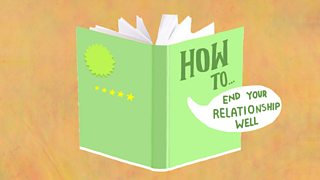How to handle conflict
It’s inevitable that we’ll all encounter conflict at some point in our lives, whether it’s at home with our partner, family or friends, at work or even with a total stranger in public. But what's the best way to get your point across without becoming overwhelmed by your emotions?
As part of Woman’s Hour’s How To series tackling life’s challenges, we asked three experts about the best way to handle conflict. Clinical psychologist Jessamy Hibberd, Ama Afrifa-Tchie from Mental Health First Aid England and dating expert and journalist Charly Lester shared their best advice…

Address any conflict head on
“If something is upsetting you, it is better to acknowledge it and bring it out in the open so that you can explain how you’re feeling and work out a solution,” says clinical psychologist Dr Jessamy Hibberd.
“No-one can read minds. You might think the other person knows what the problem is but unless you’ve told them, you can’t expect them to and they can’t do things differently.”
“Try and resolve conflict informally at the earliest possible opportunity, and seek to come to a place of mutual understanding,” says Ama Afrifa-Tchie, who is the Head of Culture and Wellbeing at Mental Health First Aid England.
“If that isn't possible, seek outside help in the form of a meditator, someone you trust - either a colleague or someone senior with influence - who can speak on your behalf.”
Listen to what the other person has to say
“One of the biggest points of conflict comes from people not feeling heard by their partner,” says dating expert and journalist Charly Lester. “Remember there are two sides and that the solution may require compromise from both of you.
“Empathise and don't simply judge the other person on how you would respond to the situation. We often think we're putting ourselves in the other person's shoes, but not everyone responds to things in the same way, or expresses themselves in the same ways, so don't put unrealistic expectations on the other person.”
Try to keep your emotions out of it
“Avoid discussing [any issues] when emotions are particularly high, and late at night when you are tired, as you may say something unnecessary which you later regret,” says Charly.
“It can be easy to jump to the wrong conclusion about what’s going on and to ascribe extreme motives to others that may not be there,” adds Jessamy. “Often it’s better to walk away for a bit and let things calm down, because when you're in that mood it's almost like you're wearing blinkers.
“Try not to make it personal. The goal is to find a solution, not to attack the other person or determine who is right or wrong.”
Ama adds: “It's always good to write down how you feel and what's happening so you can articulate it without letting your emotions get the best of you. You can also reflect on the role you've played and how you've handled the situation.”
Look at what else is going on in your life
“If it’s happening to you a lot there might be something else at play,” says Jessamy.
“When we feel good these types of problems don’t happen as much. However if you’re more stressed, sleep deprived, [or have] less capacity - it is more likely that conflict and tension will rise.
“Your mood colours how you see things and when we’re not feeling good it can be easy to slip into blaming others - it can be a defence mechanism - everyone else is wrong and if they just got this right, everything would be ok.”

In a relationship, try and reach a compromise
“Often we place far higher expectations on those closest to us. It's [about] learning to understand how your partner responds to things,” says Charly.
“There's three types of attachment [in a relationship]; avoidant, anxious and secure. An avoidant person will often pair up with an anxious person and they're almost polar opposites - an anxious person will seek more and more attention and affection and in doing so, they quite often drive the avoidant person away.
“[One example is] a husband who was avoidant and while he thought about his wife during the day, his job was just so busy that he didn’t have the time to properly respond to her text messages. She [being anxious] thought that meant he didn’t love her and he wasn't thinking about her. The compromise was that he had some pre written text messages on his phone that, when he thought of her, he would send. It became far less of a burden on him during his work day but then she still felt loved and needed.
“They came to that [idea] by actually sitting down and saying, ‘Look, you do this and it makes me feel this way.’ You might not understand how your behaviour makes the other person feel until you have that really frank conversation.”
At work, determine the next best steps
“Managing conflict poorly or unresolved conflict in the workplace has a huge impact on employee mental health and wellbeing,” says Ama.
“Employers should create workplaces that have a culture of transparency and trust, encourage safe spaces to address the issue and reach mutual solutions, and encourage employees to speak up and be taken seriously when they do.
“I would always recommend that people have an informal conversation if it’s peer on peer conflict, grab a coffee and [discuss] what the issues are and try and resolve it that way.
“Think about what is best for the team and the individual or individuals that are having that conflict - maybe they could work on a different project, or be seconded to a different team? If it's a manager or a boss involved, what kind of coaching do they need to be able to handle conflict resolution better? What is the best solution for all parties involved so they don't feel slighted, that their voices have not been heard or that they’re not important?”
Keep things face to face
“The trouble online is that you’re missing all of those cues you get from a face-to-face meeting,” says Jessamy, who warns against trying to resolve conflict via email, text or on social media.
“You're missing the tone and it can be really easy to misunderstand or misinterpret what's being said. [There are] none of the social pressures to keep things in check. You lose the ability to calm things down that you get from being with somebody too, so I think it's always much better to talk it through where possible.”
Accept that conflict is inevitable
“Avoiding conflict doesn't make it go away,” says Ama, “it just heightens the situation, causing more stress which doesn't help your mental health and wellbeing.
“It's important to have a support system that helps you talk through things and find solutions, seeing things from both sides where possible. Speak to a trusted colleague, friend or family member. If your organisation has an Employee Assistance Plan, or if you have your own therapist or counsellor, speak to them for independent advice.”
“Try and work out what the problem actually is that you’re arguing over, particularly if it comes up multiple times,” adds Charly. “In a relationship if it’s related to values or beliefs or morals, then maybe that's something larger that you do need to overcome. But if it’s just niggles, take the time to step away. Often the motivations behind it are actually completely unrelated.”
She adds: “Be realistic - there are sometimes things that you can't resolve and you have to agree to disagree. Sometimes maybe agreeing to disagree isn’t possible - there's a reason that divorces happen, that people break up. It's [about] understanding that conflict is a normal part of life but actually [working out] where on that scale of conflict is the issue and how important is it to you?”
You can listen to the discussion on 麻豆官网首页入口 Sounds, where you'll also find every episode of Woman's Hour you may have missed. Follow us on or @bbcwomanshour.




